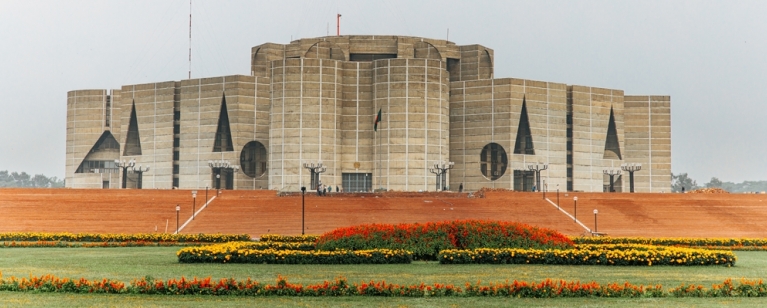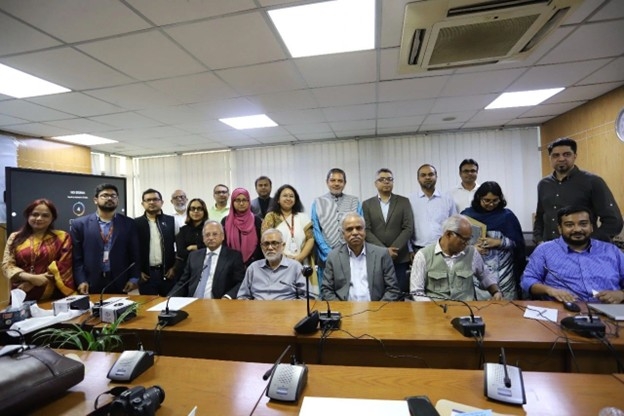
Since its founding ETI has been a leading advocate for advancing human rights and labour rights at a policy level. Over the years, ETI has supported companies to implement the UK Modern Slavery Act, pushed for the adoption of numerous ILO Conventions around the world and most recently took an active role in lobbying EU policymakers to retain the strength and scope of emerging HRDD legislation in Europe. Due to its tripartite structure - which brings together member companies, trade unions and NGOs - ETI is considered a safe space for these three constituencies to confer and agree on advocacy positions.
Influencing policymakers, however, is very context and time dependent, making each situation different; in practice, it can be hard to understand how ETI makes this work. In this case study we explore how ETI harnessed its unique structure, relationships and the trust it has with a wide variety of actors in Bangladesh to help improve labour laws to align them with international best practice and norms in the wake of political upheaval.
This case study should be interesting for anyone who wants to understand how an MSI can pro-actively advocate for workers within legislative processes. In particular, it should be interesting to companies and NGOs who would like to improve labour laws but feel that they have limited leverage on their own.
Background
In August 2024 the Government of Bangladesh collapsed following weeks of escalating protests. What started as student demonstrations against perceived favouritism in public sector hiring rapidly evolved into a broader movement, fuelled by public frustration over rising authoritarianism, allegations of electoral fraud and a range of other grievances.
After the former prime minister fled the country, the military and president endorsed the appointment of Mohammad Yunis as Chief Advisor, tasking him with forming an interim government and preparing for new elections.
In a related case study, we explore how ETI supported the garment sector during this period of upheaval – fostering meaningful stakeholder engagement and helping safeguard workers’ rights amid the unrest and its immediate aftermath.
In late 2024, the interim government announced a series of reform commissions aimed at overhauling key policies and laws ahead of the next election, scheduled for early 2026. These commissions were expected to conduct broad consultations with a range of stakeholders, and produce a detailed, actionable report. The goal was to embed socially beneficial reforms before a new administration took office. Among these bodies was the Labour Reform Commission (LRC), which began its mandate in November 2024.
ETI’s involvement
ETI Bangladesh has been active for over a decade, with its engagement in the country extending even further back though its support for the Bangladesh Accord. From the outset, ETI’s structure and approach has enabled it to build strong, trusting relationships across the garment sector. Over the years, ETI has delivered hundreds of factory-based social dialogue trainings , supported the establishment and functioning of dozens of sexual harassment complaint committees and has commissioned impactful research on labour in the garment sector.[1]
Through this long-standing and constructive involvement with civil society, the labour movement, and garment manufacturers and exporters, ETI has earned credibility as a trusted partner. Rather than driving change through confrontation, ETI works through collaborative spaces, consulting all relevant stakeholders before taking action.
This approach proved especially valuable in the wake of the political upheaval. ETI was able to bring both manufactures and trade unionists together regularly with international brands for updates on the situation facing workers. In doing so, ETI positioned itself as a trusted yet independent voice – advocating for workers’ rights, whilst also supporting the long-term sustainability of the businesses operating in the sector.
When the LRC was announced, ETI was already meeting regularly with international member companies, and NGOs on the evolving situation in the country. Recognising the opportunity to contribute to the Commission's research and recommendations, ETI moved quickly. Within a month of the LRC’s announcement that it would hold stakeholder consultations, ETI had gathered feedback from company and NGO members on their priorities for improving labour laws in the country that would drive better outcomes for workers and increase the long-term stability in the sector.
Timeline of events:
- 31 October: Reform commission announced
- 17 November: Reform commission formed
- December: Stakeholder consultations announced
- January: ETI member recommendations gathered from NGOs and Companies
- February:
- Hybrid meeting with ETI and JETI members with the LRC
- ETI consults local trade unions to review recommendations and share feedback prior to submission
- ETI Submits recommendations to LRC
- 21 March: LRC publishes report including most of ETI’s recommendations and the complete recommendations as an annex
After gathering insights from its own members ETI then reached out to partners at the Joint-ETIs, and local trade union representatives to review the initial recommendations. Perhaps unsurprisingly, they found that they were broadly aligned with what other stakeholders included local labour unions and NGOs were proposing. However, it became clear that ETI’s voice would be best placed in highlighting how Bangladesh labour laws and regulations could align better with international standards and language. These fell into two categories:
- The language and approach of human rights due diligence, and
- Just transition
Along with these themes the recommendations also broadly echoed those of other labour rights champions including the need to priorities the rights to form independent worker associations that could collectively bargain, as well as a need for focus on wages, social protection and improved grievance resolutions. An ETI NGO member indicated they were also was happy to see a renewed focus on rights of children.
The recommendations were presented to the LRC on February 6, 2025. At the meeting, held in the Department of Labour HQ, the Labour Reform Commission hosted a group of representatives from the RMG sector including ETI members (online) as well Abil bin Amin and other members of the ETI secretariat in Bangladesh and online.

At the meeting, beyond presenting the proposed recommendations from our members, the group had a lively conversation in which the reform commissioners agreed with the feedback and seemed focused on involving workers and parts of the RMG sector that are less formal such as home-based workers in the reform process.
Outcomes
This work engaged local and international partners to come up with a set of recommendations on the new labour laws. It mobilised support from ETI’s membership to back clear improvements to the laws such as alignment with international HRDD practices, and emerging concerns around Just Transition. It also helped to identify continued gaps in Bangladesh that has already resulted in further work.
Ultimately, the LRC published its recommendations to the Ministry of Labour and Employment in late March 2025. In the report they included all the recommendations of ETI as an annex[2]. In addition, they included some of the specific recommendations around HRDD in the text of the main report. Since publication the government requested that the LRC narrow down its recommendations for the labour law, something we are still awaiting.
Further work has also come out of this policy engagement. The same ETI NGO member held well attended follow up meetings regarding its in-depth research on the risks of modern slavery and child labour with a focus on subcontracting factories. LRC members attended the events.
Key insights
Policy engagement doesn’t come naturally or necessarily easily to all ETI members. Various barriers often hinder involvement. Companies and big brands might not feel it is their place to engage with governments. They may feel that although better labour rights standards would benefit them, if they speak out alone, they will alienate customers or shareholders. ETI member NGOs often do want to engage policy makers but don’t have the independent standing or access to do so effectively on the issues they care most about. ETI member NGOs often do want to engage policy makers but don’t have the independent standing or access to do so effectively on the issues they care most about. This case study shows how ETI members can overcome these impediments by acting together.
For instance, an ETI NGO member found that working with ETI gave them access to the process they otherwise might not have had. They wanted to “join forces with an organisation that has a deep-rooted presence in the country.” That presence according to our NGO member carried weight. “The LRC would take up in person meetings with ETI--they wouldn't take it with any other organisation that says, ‘we have recommendations to provide.’”
Meanwhile member companies which have policy advocacy as a strategic human rights pillar found it useful to sign on with ETI’s efforts to engage the LRC. They saw it as a genuine opportunity to act together, and gain leverage where they otherwise wouldn’t have had it. They also found the process enabled them to act quickly and easily to gain internal alignment and sign on to the recommendations.
“ETI really made it quite easy for us... I just had to keep the team internally updated [on the recommendations],” an ETI company member noted. And then just seek a “Yes/No” from leadership.
Conclusion
Throughout the political unrest in Bangladesh ETI has remained engaged in the process, taking advantage of increased civic space to support policy efforts that improve the lives of workers. Input into the LRC process was possible because of ETI’s longstanding presence in Bangladesh and deep network in the RMG sector and human rights of workers more broadly. This contributed to meaningful results for members, and policymakers, thereby supporting workers.
- ETI was able to help offer its members a chance to engage in a process they might otherwise have missed.
- The LRC recommended increased alignment with international norms around HRDD
ETI remains committed to centring the concerns of workers at the highest policy levels and doing so in a multi-stakeholder fashion. The LRC consultation may be at an end, but once the recommendations become law, ETI will continue to engage with all main actors to support their implementation in the years to come.
...
[1] See page 375, https://drive.google.com/file/d/1jrwTGHNjgRSOeId3I8jwPZIhat4n36je/view
[2] See page 4 and 5, “Annual Impact Report 2023, summary,” https://etibd.org/wp-content/uploads/2024/10/ETIBangladesh-Annual-Impac…
